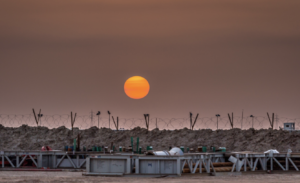Ads
Critics argue that the ratification of “climate credits” regulations on the first day of Cop29 was expedited, setting the tone for what promises to be a contentious and crucial conference. As delegates gather in Baku under foreboding skies, the urgency of the climate crisis looms large, with 2024 poised to surpass 2023 as the warmest year on record. The impacts of climate change are becoming increasingly severe, with greenhouse gas emissions reaching record highs and extreme weather events wreaking havoc across the globe. In this critical moment, the world looks to the United States, historically a key player in global climate efforts, to lead the way towards a more sustainable future.
The return of Donald Trump to the White House threatens to upend progress on climate action, as the former president has a long history of denying the reality of climate change and rolling back environmental protections. Trump’s administration from 2017 to 2021 saw a retreat from clean energy initiatives and a focus on expanding fossil fuel production, despite the growing urgency of the climate crisis. His recent election victory has emboldened his anti-climate agenda, raising concerns about the future of U.S. participation in international climate agreements.
The Biden administration’s efforts to address the climate crisis, including the groundbreaking 2022 Inflation Reduction Act, are at risk of being undermined by a Trump administration hostile to environmental regulation. The act, which directed billions of dollars towards green industries, has been a cornerstone of efforts to accelerate the transition to renewable energy and reduce greenhouse gas emissions. Trump’s threats to repeal clean energy projects and increase fossil fuel production could jeopardize the progress made under the Inflation Reduction Act and hinder efforts to combat climate change.
The international community, particularly developing nations, looks to the United States for leadership on climate action and support in adapting to the impacts of a warming world. The upcoming COP conference in Baku will be a crucial test of the U.S.’s commitment to climate action and its willingness to collaborate with other nations to address the challenges posed by climate change. The U.S.’s potential withdrawal from the 1992 UN Framework Convention on Climate Change could have far-reaching implications for global efforts to combat climate change and support vulnerable communities.
As the world grapples with the dual crises of climate change and the COVID-19 pandemic, it is more important than ever for nations to come together in solidarity and cooperation. The stakes could not be higher, as the window to prevent catastrophic climate change narrows with each passing year. The decisions made at COP29 will shape the future of our planet and determine whether we can rise to the challenge of protecting our environment for future generations.
In Baku, world leaders have the opportunity to set a new course towards a more sustainable and equitable future. The urgency of the climate crisis demands bold and decisive action, with wealthy nations stepping up to support developing countries in their efforts to build climate-resilient societies. The ratification of “climate credits” regulations on the first day of Cop29 is just the beginning of what must be a concerted effort to reduce emissions, invest in renewable energy, and promote global cooperation on climate issues.
As the world’s attention turns to Baku, the world is watching to see if the U.S. will rise to the challenge and lead the way towards a more sustainable future. The time for action is now, and the decisions made at COP29 will have far-reaching implications for the planet and all its inhabitants. It is time for world leaders to put aside their differences and work together to address the greatest challenge of our time: climate change.






